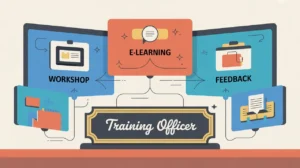What Does the Prototyping Associate Role Involve?
A Prototyping Associate is responsible for supporting the design, development, and testing of prototypes that help transform ideas into tangible concepts, tools, services, or products. They assist teams in creating early-stage models, mock-ups, or proof-of-concept solutions that can be iterated and refined through testing and feedback. Their work often spans both technical and creative tasks, helping program, product, or innovation teams bring strategies and concepts to life.
In nonprofits and social enterprises, Prototyping Associates play a key role in innovation processes, enabling organizations to experiment, validate ideas, and adapt solutions efficiently before scaling.
At What Level does this Role Operate?
Entry to Mid Level: Prototyping Associates typically operate under the supervision of a Prototyping Lead, Innovation Manager, or Program Manager. They focus on hands-on execution, building and refining prototypes in collaboration with cross-functional teams. Depending on the organization, this may include digital tools, service blueprints, physical models, or process simulations.
Relative Employability: Prototyping Associate roles are increasingly relevant in organizations focused on human-centered design, digital transformation, or innovation in program delivery. They are particularly common in organizations that pilot new approaches before full implementation.
Relative Pay Scale: Prototyping Associates generally occupy the lower to mid pay bands. Their compensation reflects their technical and creative execution responsibilities, sitting above administrative support roles but below specialist or managerial positions.
What are the Key Responsibilities and Activities?
- Support the design and construction of prototypes for programs, products, services, or processes
- Create wireframes, mock-ups, or physical models using relevant tools and materials
- Collaborate with cross-functional teams to translate concepts into testable artifacts
- Gather user feedback through testing sessions and document insights for refinement
- Iterate on prototypes based on feedback and evolving requirements
- Maintain documentation of prototype versions, design choices, and testing results
- Assist in setting up testing environments, logistics, and data collection processes
- Contribute to design workshops and brainstorming sessions, offering creative and technical input
What Core Competencies and Qualifications are Needed?
Required Qualifications and Experience
The following reflect common qualifications and experience expected for this role, while recognizing that pathways may vary by context, organization, and region.
- Relevant academic background in design, engineering, technology, or related fields
- Experience with prototyping tools and methods (e.g., wireframing software, 3D modeling tools, or service design methods)
- Familiarity with human-centered design, agile development, or innovation processes
- Strong technical execution and creative problem-solving skills
Key Competencies
- Hands-on proficiency with relevant prototyping tools and materials
- Creativity and ability to translate abstract concepts into tangible forms
- Attention to detail and ability to iterate quickly based on feedback
- Strong collaboration and communication skills in multidisciplinary teams
- Curiosity and willingness to experiment and learn through doing
- Organizational skills to track versions and maintain clear documentation
How are AI and Automation Shaping this Role?
An AI-native Prototyping Associate can use AI tools to accelerate the creation of wireframes, generate design variations, and simulate user interactions. Generative design tools can produce multiple prototype options quickly, while automation can streamline testing workflows, data collection, and version control. These technologies enable faster iteration cycles, allowing associates to focus more on refining user experience and functionality.
What Career Pathways and Transferable Skills are Associated with this Role?
Prototyping Associates can progress to roles such as Prototyping Lead, Product Designer, Innovation Specialist, or Program Technology Officer. Their skills in design, iteration, and problem solving are transferable to roles in product development, user experience design, digital transformation, and innovation strategy. Over time, they may take on greater responsibility for leading design sprints, managing prototyping labs, or driving organizational innovation initiatives.







